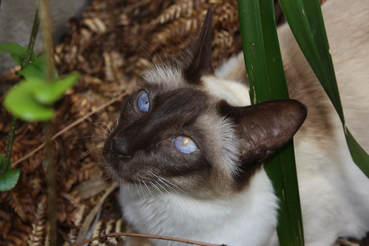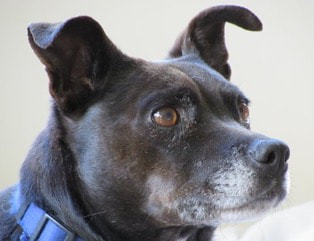 Herbal treatment was effective and the use of antibiotics was not required. Kiki is an 8 year old, female spayed Balinese cat. Kiki presented with a history of three chest infections over the last 5 years (3 lots of antibiotics) and in the last 3 months an occasional watery discharge from the left eye. In the last few weeks she developed a purulent discharge from the left eye and left nostril . She was still bright and eating. On examination there was evidence of bilateral conjunctivitis with a muco-purulent discharge from the left eye and left nostril. Her mandibular glands were slightly enlarged and she had a mild tonsillitis. Conventional diagnosis: Upper respiratory tract infection, possible maxillary sinus involvement and conjunctivitis. Therapeutic Goals: To clear the conjunctivitis and nasal discharge. To enhance the immune system and prevent further susceptibility to respiratory weakness. A herbal tincture was prepared addressing the above therapeutic goals. Kiki responded well to the herbal combination and within 3 days the discharge had almost resolved, within 7 days she was symptom free. She was keep on the preparation for 4 weeks to ensure that a deeper level of immune support was achieved. The owners noted that her breathing sounded clearer, they had noticed mild snoring over the last few months prior to the outbreak of disease which had now resolved.  Bruce's skin was a chronic problem despite conventional treatment and his diabetes was poorly controlled for many years. Within six months of introducing herbal remedies and stem cell treatment his quality of life improved significantly with respect to the skin, diabetes and his general vitality. Bruce is a 9 year old male, desexed Pitbull Terrier who presented with diabetes and chronic skin infections. History: Bruce was diabetic for 5 years (difficult to control) he had chronic (years) skin allergies and interdigital pyoderma (histology confirmed Chronic Suppurative Podo-dermatitis, he had bleeding sores between his toes), antibiotics were ineffective in treating the feet (numerous cultures undertaken, no resistances noted to antibiotics used – long courses), chronic conjunctivitis, anal and lip papilloma virus (warts) and anal gland infections. Response to conventional treatment was poor. In the past prednisone (prior to diabetes) and non-steroidal anti-inflammatories had been used. His water intake was elevated and he was very lethargic. Treatment Goals: To control the diabetes and try to reduce the insulin requirements. To maintain a more stable glucose curve. To improve the skin. To detoxify the body and treat potential gut health imbalance. To strengthen the immune system, restore balance and improve vitality. Herbal tinctures based on the individual needs of Bruce over the course of treatment were prepared to address the treatment goals. Bruce has been on herbal treatments now for 12 months. His skin has improved significantly over this time and his insulin requirements dropped by 3 IU twice daily. In the last 6 months we also changed his diet to a completely homemade diet for diabetic dogs and incorporated stem cell treatment into the regime. He is now the best he has been in years. His quality of life has improved significantly and his diabetes is well controlled.  Lucy had been on conventional treatment for recurrent bladder infections for a few years, after herbal intervention the frequency of the infections and her general vitality and wellbeing improved significantly. Lucy is a ten year old, female/desexed West Highland Terrier who presented with recurrent bladder infections, ear infections and skin disease over the past three years. The conventional interventions have included a cystotomy (bladder surgery), numerous urine cultures with sensitive bacteria, long courses of antibiotics and non-steroidal anti-inflammatories. Histopathology supported chronic cystitis and bladder polyps. Her diet was a prescription urinary tract dried food. On examination her presenting signs were bilateral ear infections, conjunctivitis, tartar and hyperplastic gum margins. Recessed vulva with secondary vulval congestion and inflammation. Treatment Goals: Treat the potential digestive imbalances, reduce toxins in the body, improve general immunity, health and vitality. Reduce the bouts of cystitis, reduce vulval inflammation, improve skin and gum health. Consider an operation to undertake vulval episioplasty/repair. Herbal tinctures addressing the above treatment goals were prescribed. A herbal based cream was also applied topically to the vulva. Lucy experiences fewer episodes of urinary tract infections, her skin and ears have improved significantly. Her owner said she is the happiest she has been in the last 12 months. She is also on a homemade diet supporting urinary tract health, her urine is monitored and the occurrence of bladder infections has reduced significantly. The vulva health is maintained, with topical treatments.  The use of an herbal tincture and nutraceuticals have improved Bunty's quality of life, controlled the level of pain from arthritis and reduced the need for non-steroidal anti-inflammatories. A Staffordshire spayed female bull terrier who is 12 years old, presented due to an ongoing weight bearing lameness of the right hindleg. Non-steroidal pain treatment provided relief, but the pain returned if the medications were discontinued. The owners request was to try and reduce the use of non-steroid pain relief and maintain joint comfort. On physical examination Bunty exhibited pain on manipulation of her neck, right hip and stifle (knee joint). There was also sensitivity over the spine. Radiographs and bloods were undertaken. Gastrointestinal sensitivity was evident with intermittent diarrhoea and an intolerance to raw food and bones. Her coat was dull and dry. Radiographs diagnosed bilateral hip dysplasia, with the right hip showing more advanced signs of deterioration and osteoarthritis. Treatment goals:
In Summary: Bunty has now been on the formula for 18 months. Her general demeanour, coat quality and vitality have improved significantly. She only requires non-steroidal pain relief on very few occasions with the herbs and nutraceuticals controlling most of the pain. She will be maintained on this formula at this stage indefinitely as the owners feel it has significantly improved her quality of life. |
AuthorJacqui writes here about successful case studies and insights gained through her work and study. Archives
February 2023
Categories
All
|

 RSS Feed
RSS Feed